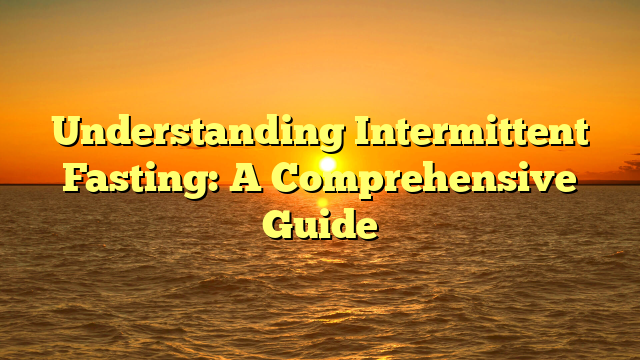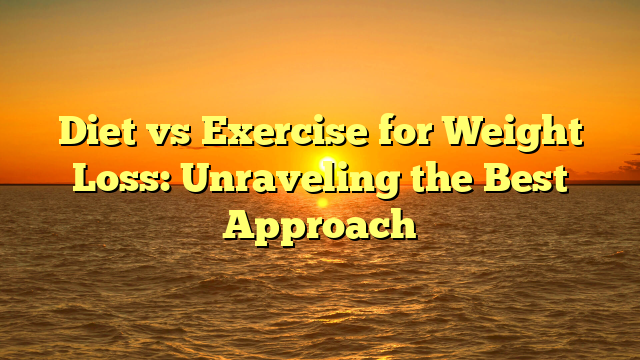Diet or Exercise for Weight Loss: Discover Your Best Option
So have you ever wondered about diet or exercise for weight loss? When it comes to weight loss, the age-old question remains: which is more effective, diet or exercise? While both play important roles in achieving weight loss goals, understanding the benefits and considerations of each can help you determine the best approach for your journey towards a healthier lifestyle.
Experts agree that a balanced diet that focuses on nutritious foods is crucial for weight loss. Incorporating fruits, vegetables, lean proteins, and whole grains into your meals can provide essential nutrients while helping you manage your calorie intake. However, it’s important to remember that diet alone might not be enough to achieve your weight loss goals.
Exercise, on the other hand, is key for burning fat, preserving muscle, and achieving long-term success. Engaging in regular physical activity, such as brisk walking or Zumba, can not only aid in weight loss but also have additional health benefits like improving sleep quality and reducing stress.
So, instead of choosing between diet and exercise, it’s best to find the right balance between the two. By combining a balanced, healthy diet with regular physical activity, you can optimize your weight loss journey and improve your overall health and well-being.
Diet or exercise for weight loss Key Takeaways:
- Both diet and exercise are important for weight loss.
- A balanced diet focuses on fruits, vegetables, lean proteins, and whole grains.
- Regular exercise aids in weight loss and offers additional health benefits.
- Finding the right balance between diet and exercise is crucial for long-term success.
- Combining a healthy diet with regular physical activity is key to achieving meaningful and sustainable weight loss.
Importance of Exercise for Weight Loss
When it comes to weight loss, exercise is an essential factor that should not be overlooked. While diet plays a significant role in managing calorie intake, exercise is crucial for burning fat, achieving a leaner body composition, and ultimately reaching your weight loss goals. Engaging in regular exercise not only helps you shed pounds but also offers numerous health benefits.
A well-rounded exercise routine should include a combination of cardiovascular activities, such as brisk walking or cycling, and strength training exercises like resistance training or weightlifting. Cardio exercises help burn calories and fat, while strength training helps build and preserve muscle mass. Both types of exercise contribute to weight loss by increasing your metabolism and improving your body’s ability to burn calories.
In addition to weight loss, exercise offers other significant benefits. It can improve sleep quality, reduce stress levels, boost mood, and enhance overall well-being. Physical activity also plays a crucial role in maintaining weight loss in the long term. By incorporating exercise into your daily routine, you establish healthy habits that support weight management and overall health.
The Role of Exercise in Effective Weight Loss Strategies
Here are some effective weight loss tips to incorporate exercise into your weight loss program:
- Set realistic goals: Start with small, achievable goals and gradually increase the intensity and duration of your workouts.
- Find activities you enjoy: Choose exercises that you find enjoyable and are more likely to stick with in the long term, such as dancing, swimming, or hiking.
- Stay consistent: Aim for at least 150 minutes of moderate-intensity aerobic activity or 75 minutes of vigorous aerobic activity per week, along with strength training exercises at least two days a week.
- Seek professional guidance: Consult a fitness professional or personal trainer to create a tailored exercise plan that suits your specific needs and abilities.
Regular exercise is not only key to weight loss but also offers a wide range of health benefits, including improved cardiovascular fitness, reduced cholesterol levels, and enhanced mental well-being. It is an essential component of any effective weight loss strategy.
The Role of Diet in Weight Loss
When it comes to weight loss, diet plays a crucial role alongside exercise. A healthy and balanced diet is key to achieving your weight loss goals. It is important to focus on nourishing your body with the right nutrients while creating a calorie deficit.
A weight loss diet should include a variety of fruits, vegetables, lean proteins, and whole grain carbs. These foods are rich in vitamins, minerals, and fiber, which can help keep you feeling full and satisfied. Additionally, they provide essential nutrients that support your overall health.
Avoiding excessive calorie restriction is important to prevent muscle loss and slow down your metabolism. Instead of drastically cutting calories, focus on creating a modest calorie deficit. This can be achieved by choosing nutrient-dense foods that are lower in calories but high in satiety.
While some diets may promise fast results, it is important to choose a healthy and sustainable approach. Crash diets or restrictive eating plans are often difficult to maintain and can lead to nutrient deficiencies or an unhealthy relationship with food. By focusing on a balanced, healthy diet and making gradual changes to your eating habits, you can achieve long-term weight loss while nourishing your body.

Finding the Right Balance For Diet or Exercise for Weight Loss
When it comes to weight loss, the age-old question is whether diet or exercise is more effective. But why choose one when you can have both? Finding the right balance between diet and exercise is the key to achieving successful and sustainable weight loss.
Research has shown that combining modest calorie restriction with regular exercise leads to significant weight loss compared to relying on exercise alone. When you reduce your calorie intake and engage in physical activity, you create a calorie deficit, which prompts your body to burn stored fat for energy.
But it’s not just about the numbers on the scale. A combination of diet and exercise offers numerous benefits beyond weight loss. Regular exercise helps improve cardiovascular health, increase muscle strength, and boost metabolism. A nutritious diet, on the other hand, provides the necessary fuel for your workouts and ensures you’re getting all the essential nutrients your body needs.
By finding the right balance between diet and exercise, you can create a healthy lifestyle that supports your weight loss goals. Focus on nourishing your body with whole, nutrient-dense foods while incorporating regular physical activity into your routine. Remember, it’s about making long-term, sustainable changes rather than opting for quick fixes.

Benefits of a Balanced Approach:
- Effective weight loss
- Improved cardiovascular health
- Increase in muscle mass and strength
- Boosted metabolism
- Enhanced overall well-being
Combining a healthy diet with regular exercise is the winning formula for successful weight loss. It’s not about choosing one over the other; it’s about finding the right balance that works for you.
The Impact on Heart Health
When it comes to weight loss, it’s important to consider the impact on your heart health. Both diet and exercise play significant roles in maintaining a healthy heart. Incorporating a heart-healthy diet into your lifestyle can reduce the risk of cardiovascular diseases. This includes consuming plenty of fruits, vegetables, whole grains, healthy fats, and lean proteins. The Mediterranean diet and the DASH diet are examples of eating patterns that support heart health.
Exercise is equally important for maintaining heart health. Regular physical activity can lower blood pressure, improve cholesterol levels, and enhance cardiovascular fitness. Including activities like brisk walking, cycling, swimming, or aerobic classes in your exercise routine can have a positive impact on your heart. By combining a heart-healthy diet with regular exercise, you can reduce the risk of heart disease and promote overall cardiovascular wellness.
The Relationship Between Weight Loss and Heart Health
Weight loss can have a significant impact on heart health. Losing excess weight can improve cardiovascular function and reduce the strain on your heart. When you shed pounds through a combination of diet and exercise, you decrease the risk factors associated with heart disease, such as high blood pressure, high cholesterol, and diabetes.
The benefits of weight loss on heart health are not just limited to physical changes. By maintaining a healthy weight, you can also reduce inflammation in the body and improve blood vessel function. These factors contribute to a healthier heart and a decreased risk of cardiovascular events.
“Combining a heart-healthy diet with regular exercise can help reduce the risk of heart disease and promote overall cardiovascular wellness.”
Diet or exercise for weight loss – Key Takeaways
- A heart-healthy diet that includes fruits, vegetables, whole grains, healthy fats, and lean proteins is crucial for maintaining heart health.
- Regular exercise can lower blood pressure, improve cholesterol levels, and enhance cardiovascular fitness.
- Weight loss can have a significant impact on heart health by reducing risk factors associated with heart disease.
- By combining a heart-healthy diet with regular exercise, you can promote overall cardiovascular wellness and reduce the risk of heart disease.
Building Muscle and Mental Health
When it comes to achieving your fitness goals, focusing on both diet and exercise is essential. Not only does exercise help build muscle, but it also has a positive impact on your mental health. Resistance training, combined with a high-protein diet, is key to building muscle mass. Progressive overload and sufficient protein intake are necessary to stimulate muscle growth and repair. By incorporating compound exercises such as squats, deadlifts, and bench presses along with a diet rich in lean protein sources like chicken, fish, and tofu, you can maximize muscle building potential.
Exercise is also proven to have numerous mental health benefits. Engaging in regular physical activity releases endorphins, which are natural mood boosters. Exercise has been shown to reduce symptoms of anxiety and depression while enhancing overall well-being. Whether it’s going for a run, attending a yoga class, or participating in team sports, finding an exercise routine that you enjoy and can stick to is crucial for improving mental health.
Incorporating both diet and exercise into your fitness journey not only helps you build muscle but also improves your mental well-being. Remember to consult with a healthcare professional or a certified trainer before starting any new diet or exercise program.
The Importance of a Combination Approach
When it comes to weight loss, a combination approach that incorporates both diet and exercise is essential for optimal results. While diet plays a significant role in managing calorie intake and promoting weight loss, exercise is crucial for burning fat, preserving muscle, and achieving long-term success. By combining these two factors, individuals can maximize their weight loss journey and improve their overall health and well-being.
Research has shown that weight loss programs that combine both diet and exercise components lead to greater and more sustainable weight loss compared to interventions based on changes to either diet or exercise alone. It is not about choosing one over the other, but finding the right balance that works for you. Incorporating healthy eating habits and regular physical activity into your daily life ensures a comprehensive approach to weight loss.
By adopting a combination approach, you can benefit from the positive effects of both diet and exercise. Diet helps to control calorie intake, while exercise aids in burning calories and boosting metabolism. Together, they create a synergistic effect that promotes optimal weight loss. Whether it’s engaging in cardiovascular activities like running or cycling, or incorporating strength training exercises into your routine, finding activities that you enjoy will make it easier to stick to your weight loss goals.
The Benefits of a Combination Approach:
- Maximizes weight loss efforts
- Promotes fat burning and muscle preservation
- Improves overall health and well-being
- Boosts metabolism and calorie burn
- Increases energy levels and stamina
By taking a comprehensive approach to weight loss that combines diet and exercise, you can achieve meaningful and sustainable results. Remember to consult with a healthcare professional or registered dietitian before making any significant changes to your diet or exercise routine to ensure it aligns with your individual needs and goals.
Long-Term Success and Lifestyle Changes
When it comes to weight loss, sustaining long-term success requires more than just a quick fix or temporary solution. Adopting healthy habits and making lifestyle changes are essential for achieving and maintaining a healthy weight. By incorporating these changes into your daily routine, you can set yourself up for long-term success and overall well-being.
One of the key factors in long-term weight loss is being mindful of your food choices. Instead of focusing solely on quantity, consider the quality of the foods you consume. Opt for nutrient-dense options such as fruits, vegetables, lean proteins, and whole grains. These foods provide essential vitamins, minerals, and fiber, while also keeping you satisfied and nourished.
In addition to making healthy food choices, regular exercise should be a fundamental part of your lifestyle. Engaging in physical activity not only burns calories and helps with weight loss but also offers numerous other health benefits. Incorporate activities that you enjoy and find sustainable for the long term, whether it’s walking, biking, swimming, or participating in group fitness classes. The key is to find something that keeps you motivated and engaged.
Remember that achieving long-term success in weight loss is a gradual process. It’s not about drastic changes or restrictive diets but rather about making sustainable lifestyle changes. By adopting healthy habits, focusing on nutritious foods, and staying active, you can achieve meaningful and sustainable weight loss while improving your overall health and well-being.
Weight Loss Maintenance Strategies
Maintaining weight loss is a continuous journey that requires ongoing strategies and lifestyle changes. After achieving your weight loss goals, it is crucial to implement effective maintenance strategies to prevent weight regain. Here are some key strategies to help you maintain your weight loss:
- Consistency with Exercise: Regular physical activity is essential for weight maintenance. Aim for at least 150 minutes of moderate-intensity aerobic exercise or 75 minutes of vigorous-intensity aerobic exercise per week. Additionally, incorporate strength training exercises to preserve muscle mass and boost metabolism.
- Adopt a Balanced Eating Plan: Continue following a balanced and nutritious eating plan that supports weight maintenance. Focus on consuming a variety of fruits, vegetables, whole grains, lean proteins, and healthy fats. Be mindful of portion sizes and avoid excessive snacking or emotional eating.
- Mindfulness of Calorie Intake: Stay aware of your calorie intake and make mindful choices. Monitor your daily food and beverage consumption, including portion sizes, to prevent overeating. Keep a food diary if it helps you track your calorie intake more effectively.
- Stay Hydrated: Hydration is important for overall health and weight maintenance. Drink an adequate amount of water throughout the day and limit sugary drinks and alcohol, as they can contribute to excess calorie intake.
- Regular Self-Monitoring: Continue to monitor your weight regularly to stay accountable and catch any fluctuations early on. This can help you make necessary adjustments to your diet and exercise routine if needed.
Remember, consistency and sustainable habits are key to maintaining weight loss. By incorporating these strategies into your daily life, you can enjoy the benefits of a healthier weight in the long run.
Diet or exercise for weight loss Expert Tip:
“Weight maintenance is a lifelong commitment. It requires a shift in mindset towards adopting healthy and sustainable habits rather than relying on restrictive diets or excessive exercise. Focus on nourishing your body with nutrient-dense foods, staying active, and finding joy in the process. Remember, small, consistent changes lead to long-term success.” – Dr. Amanda Johnson, Registered Dietitian
Diet or exercise for weight loss – Conclusion
In summary, both diet and exercise are key elements in a successful weight loss strategy. While diet is important for managing calorie intake and promoting weight loss, exercise plays a crucial role in burning fat, preserving muscle, and ensuring long-term success.
By combining a balanced and healthy diet with regular physical activity, individuals can optimize their weight loss journey and improve their overall health and well-being. It’s essential to find the right balance between diet and exercise, as this approach yields the best results.
Remember, there is no one-size-fits-all approach to weight loss. It’s important to find a strategy that works for you and is sustainable in the long run. Focus on making lifestyle changes rather than seeking quick fixes, as long-term success is achieved through consistent healthy habits.
Whether you choose to focus on diet or exercise, the most effective weight loss strategies integrate both. By adopting a lifestyle that incorporates a healthy diet and regular physical activity, you can reach your weight loss goals and maintain them for the long term.
Diet or exercise for weight loss – FAQ’s
Does diet or exercise play a more important role in weight loss?
Both diet and exercise are important for weight loss. While diet helps manage calorie intake, exercise is crucial for burning fat and preserving muscle.
What kind of diet is recommended for weight loss?
A balanced diet that focuses on fruits, vegetables, lean proteins, and whole grains is recommended for weight loss.
How often should I exercise for weight loss?
It is recommended to engage in five to seven workouts per week, each lasting 50 minutes at a moderate intensity.
What are some exercises that aid in weight loss?
Brisk walking, Zumba, and resistance training are examples of exercises that can contribute to weight loss.
Can I achieve weight loss with diet alone?
While diet alone can lead to weight loss, incorporating exercise into your routine is important for optimal results.
Do I have to restrict calories significantly to lose weight?
It is important not to restrict calories too much, as this can slow down metabolism and lead to muscle loss. Aim for a healthy daily calorie count based on your body weight.
Is it better to focus on diet or exercise for weight loss?
Rather than choosing between diet or exercise, it is best to find the right balance between the two for optimal weight loss results.
Can diet and exercise improve heart health?
Yes, both dietary changes and regular exercise are important for maintaining a healthy heart and reducing the risk of heart disease.
Can exercise help with building muscle and improving mental health?
Yes, resistance training combined with a high-protein diet is essential for building muscle, while exercise releases mood-boosting endorphins and can reduce rates of depression and anxiety.
How can I maintain weight loss in the long term?
Regular exercise, continued healthy eating habits, and mindfulness of calorie intake are crucial for weight maintenance. It is important to adopt sustainable habits and make lifestyle changes.







